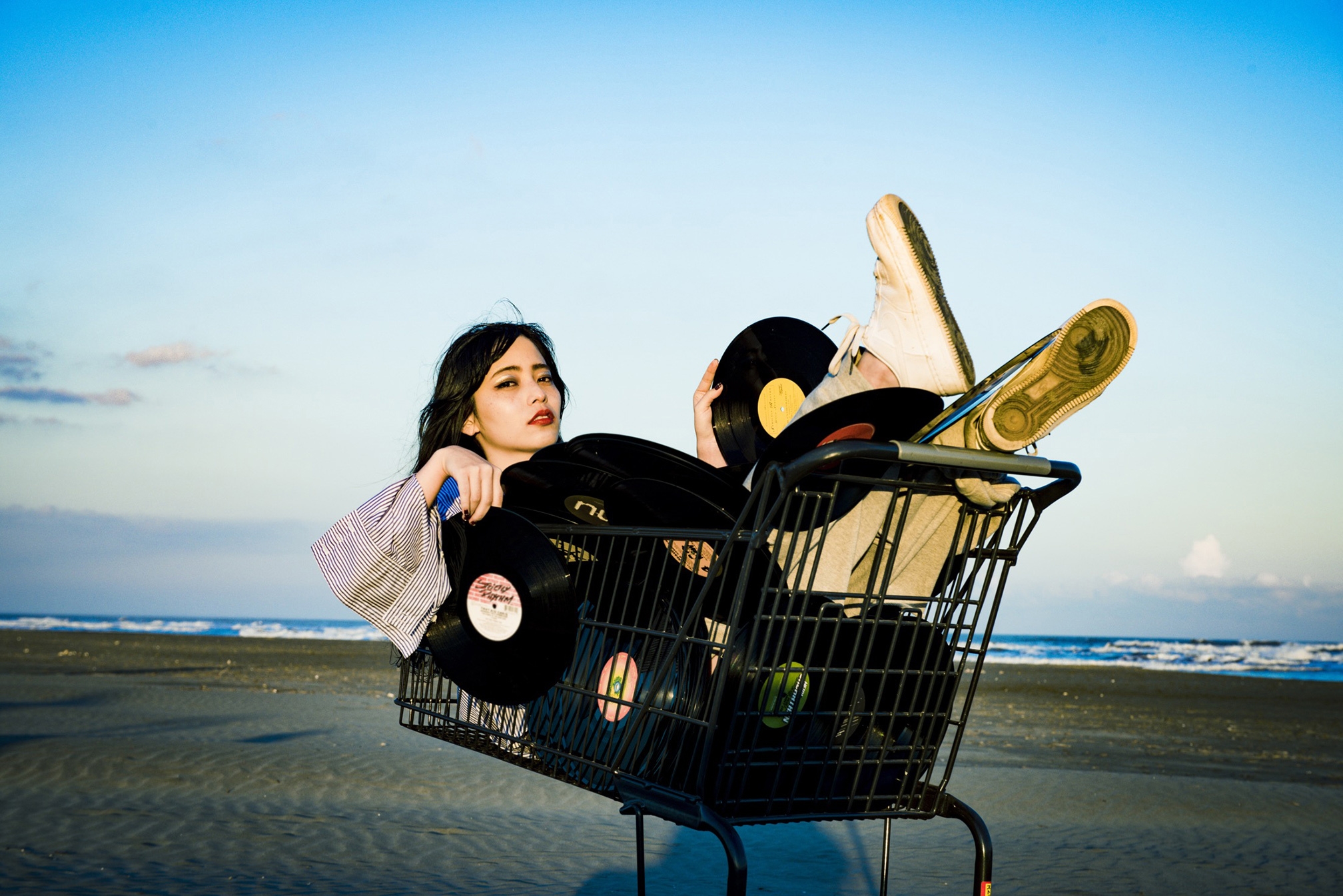 Features
Features
Licaxxx, Japan’s vintage-sounding house music icon is ready to take on the world
Japan's one-to-watch is more than just a DJ, she represents the new generation of Japan's modern music culture
For an artist who has barely spent three decades on this planet, Licaxxx knows a lot more about music than your average punter. She’s fine-tuned a style and sound that wows a fickle music crowd with a track selection that has even the most enlightened DJ reaching for Shazam. She also represents a new generation of artists in Japan, one that breaks free from the ultra-elite music community created by her predecessors. While she enjoys the benefits of the well-developed music culture laid out for her, she doesn’t rely on much else from the older generation and instead nurtured her own music community through a modern kind of praxis that she flexes in many worlds outside of music. Aside from being a DJ and beatmaker in Japan, Licaxxx is a writer, editor, radio personality and more. She founded Tokyo Community Radio to educate youths about underground music and through her regular contributions to Tokyo 20xx, her prowess for storytelling unfolds in articles she writes that teach about a different kind of culture than is taught in schools — music.
But crossing borders has always been a slog for artists in Asia. Licaxxx however belongs to a very connected society thanks to digitalisation and is breaking through these barriers — now she’s ready to go global. A 2017 Boiler Room appearance helped catapult her into the limelight and essentially solidified her skills as a selector in the eyes of the world (the comment section that ensued was full of pleas for track IDs and a nod goes to the guy who said he wanted to do pills in the shower for her set). Today, when she’s not playing lo-fi house and raw techno in Tokyo’s underground clubs, she’s gaining a new legion of fans abroad through gigs at clubs like DC10 in Ibiza and festivals like Into The Valley. Just last month, she was the only DJ to be featured on a bill alongside Peggy Gou — and just like that, a global star was born. Get to know Licaxxx...
First thing's first, how do we pronounce Licaxxx?
Just say it exactly as its spelt — 'li' as in lip.
What's the best thing about living in Tokyo?
All the delicious food, records shops, onsens and more.
And the worst?
Europe and New York are far away.
Take us out for a night in Tokyo — from dinner, drinks, party to afterparty?
I'd definitely start at a restaurant called Kabi. After that, we’d go to a DJ bar or club in Shibuya. But there are endless cheap and delicious eats in Tokyo — it's worth the trip alone just to eat.
If we were to revisit the start of your career, where would this place us? What was the impetus from music being something you listen to something you live for?
When I was a teenager, I played in a band, and I listened to the radio as a way to learn about music. THEN....one day I serendipitously heard Gilles Peterson's radio show. It was so interesting to listen to music that nobody else was listening to. It also really made me want to deliver music in the same way. That was the start of DJing as a hobby.
When I was a college student, after classes, I would go out to clubs and see DJs in Shibuya. Almost all young Japanese like pop music, or songs that everyone knows. So while I had lots of friends, I always went to clubs alone because my friends just weren't into it. By the time I graduated from college, I had really pierced the house and techno culture in Japan. I had my own radio program on FM radio, I was appearing in a lot of media, and was offered gigs at clubs all over Japan. I was the only well-known house and techno DJ in my age group (I was in my 20s at the time). So it was an easy decision when it came to what I wanted to do after college — DJing was the only option.
Your innate music selection is far beyond your years, and your track lists have even the most elitist music lover scrambling for Shazam. How do you go about discovering the music that you play?
I've been searching for music on the internet since the moment I realised that track makers and labels are all connected. I wanted to know everything there was to know about every connection that existed. So I would search more and listen to more. And then search some more. I also listen to a lot of DJ mixes and playlists. A lot.
On weekends, I go to a lot of clubs and listen to my favourite DJs. We have a lot of overseas artists coming to Japan, and so many great Japanese DJs live in Tokyo. Not to mention the choices we have when it comes to record shops. I spend a lot of time in them and the people who work there feed me recommendations.
Really, I just listen to music as often as I breathe. I just love it.
That said, a lot of the music you play has more in common with ambient music than house or techno, how does that translate to club bookings and large dance floors? Do people always get it?
Definitely. I like the kind of house and techno that sounds a bit strange on a large floor. But I'm also very conscious of making people excited. I control the groove so that people's bodies move to the music rather than letting them move physically. By doing so, my "strange" kind of house and techno works well even on a large dance floor.

Literally, everything cultural in Japan is like absolute mastery of its form. That's especially true for its music scene, which has bred some of the world's most respected DJs. So what is it really like for a young DJ in Japan? Is it hard to be accepted and is there a lot of pressure to be perfect?
Regardless of how many good (or not good) DJs there are in Japan, there is a smaller audience when compared to Europe. Club culture that pushes music without lyrics is hard to accept. When I started my career as a DJ, I had the impression that there were very few or even no young DJs left. Over the past few years, however, the amount of young talent has grown, and these young talents are also bringing in their own young heroes from abroad, and a new wave of lively and youthful parties is taking hold. These parties totally differ from what the veterans are doing. Today, there is a thriving young audience, and while we hugely respect the veteran DJs in Japan, what we are doing is something totally different from what they do.
In my case, I present music not only through clubs but also through magazines, TV and radio. I translate and introduce club music to young people who don't know anything about it. I teach them what styles match what moods, and suggest what they should listen to at the beach on a summer evening. I also introduce cultures other than music, like fashion, art, books, movies and more. That allows young people to become interested in me first based on having things in common; music comes next. Then when I play, I see a lot of young people come out who have never been to a club before. It helps to experience a culture in another way, like from "cool" friends instead of just teachers.
That said, the Japanese legends see this too. If a young artist has a deep love for music and the ability or promise of a becoming a fine DJ, they see that. Then, they might give us some advice, or even invite us to play at their festivals or help us get booked overseas.
The station you founded, Tokyo Community Radio, has developed somewhat of a cult following. Besides just playing music, is there a broader idea or concept behind it that's created this movement that you founded?
I started Tokyo Community Radio because no radio station in Japan would play local artists or lesser-known foreign artists. It's a lot like a Japanese version of NTS. Also, since there is no house party culture in Japan, there aren't many places other than clubs where DJs gather to listen to music together. So the station actually functions as a secret base. Currently, we are five DJs or crews who are all interested in slightly different genres that are in charge of the regular programming. That's the goal, to continue to act as a clandestine base for newcomers as well as domestic and international artists. It's the next step towards building a new kind of club culture in Tokyo.
It's often said that the rest of Asia's underground music scene is a behind the rest fo the world. But Japan is another story; it's ahead of the world. What separates Japan from the rest of Asia?
Well, compared to other Asians, Japanese are poor at speaking English. Many people are not good at communication, and I think that makes them reluctant to go out into the world. But there are so many passionate and serious music nerds here. As with food, music culture has a sharp and sensitive sense of sound, so there's a lot of new music coming out of Japan — that may be the difference from other Asian countries. Young DJs like me are also enjoying the benefits that the legends before us created, and then we use the Internet to communicate that with the rest of the world.

Vinyl gets heavy to carry around. As a person who grew up in a digitalised society, what's your affinity with vinyl all about?
When I first started DJing, I bought all my music on CDs or data. But as I became more serious about it, I began to understand better and appreciate the music created and played by artists who also produce vinyl — they have an entirely different sound quality and philosophy. So I started collecting vinyl and quickly realised that when I played a song on vinyl, the groove was different from when I'd play the same song on a CD, which would give off a distorted BPM and sound quality. But in reality, I have to use both records and data. When I go abroad, I actually rip my music and take it as data — because you're right, vinyl is certainly heavy and cumbersome.
What gives you a better buzz, house or techno?
Techno.
You, and only you, were just billed alongside Peggy Gou at Contact Tokyo. Both being female DJs from Asia with a vested interest in fashion, we're curious to know how you guys vibed? What did you talk about? Might we see something from you both together in the future?
Actually, we played together in Japan three years ago. At that time, Peggy was still growing, and only those who really knew and liked club music in Japan knew of her. But now she is a hero here. She has matured so much as an artist, but she remembers me well. After this most recent show together, we realised there might be an age difference between us, but we respect each other as if we were sisters. Also, a lot of people now know her as a fashion icon, but of course, she has DJ skills — I value the balance of both. I didn't have much chance to talk to her this time, but she told me that I have grown up too.
Let's forget about music for a second; how would you describe yourself as an artist?
I am not so much an artist as a person who introduces artists. I think I'm closer to a curator of art. I prefer 1 to 10 rather than 0 to 1. But it's the artists that have the most respect and admiration. In fact, I think many artists in Japan trust me because my axis of curation is always on point.
What's the most important piece of work you've ever completed in your entire life?
I did 20 tours in Japan last year. I was surprised to see so many young people from all over the country come out to all of them. The final show was in Tokyo was an all-night-long set, and 1,000 people came out. It was meaningful to me because a 20-something-year-old Japanese DJ walked into a party in the middle of the night and there were 1,000 people there to see her play — it was something I'd never experienced since I started DJing. There were also quite a few people whose first time it was going to club...ever. It was good to see them dancing hard until the early house of the morning.
At one point DJing became not enough anymore, and now you contribute regularly to Tokyo 20xx. What's the story you're telling there?
The world depicted in Akira has become a reality, which is the state of being very reluctant to make political statements. It is not an exaggeration to say that Japanese politics is corrupt and one-party dictatorship. We need to be aware that we have to do something about it, not flee overseas, and that's what I like to write about. There are great artists in various fields, and they are influential, but they are not utilised.
It is also remarkably difficult to get information on electronic music in Japan. Soooo…what are the Japanese techno records that everyone should know about?
Aoki Takamasa ‘Internally Combusted’
Yoshinori Hayashi ‘γ’
Iori ‘Galaxy (Lord Of The Isles Remix)’
Powder ‘H’
YPY ‘OVER SMILING DUB’
Mars89 ‘Sky Burial’
Tokyo has some of the most revered bars and listening spaces in the world. What under-the-radar haunts do you recommend for good music?
It's fun everywhere in Japan but I love Koara and Circus for a good groove.
If the world were ending, what’s the last record you would play?
Anything by Andy Stott or Tatsuro Yamashita.
In five years, I will be…
I’ll be a DJ trusted by artists around the world who want me to play their tracks.
LICAXXX debuts in Hong Kong and Saigon this week with her crate full of vintage sounding house music. Beginning Friday 21 February in Hong Kong and Saturday 22 February in Ho Chi Minh City. Spots are available for the first ten people to e-mail us at [email protected] for either event.


